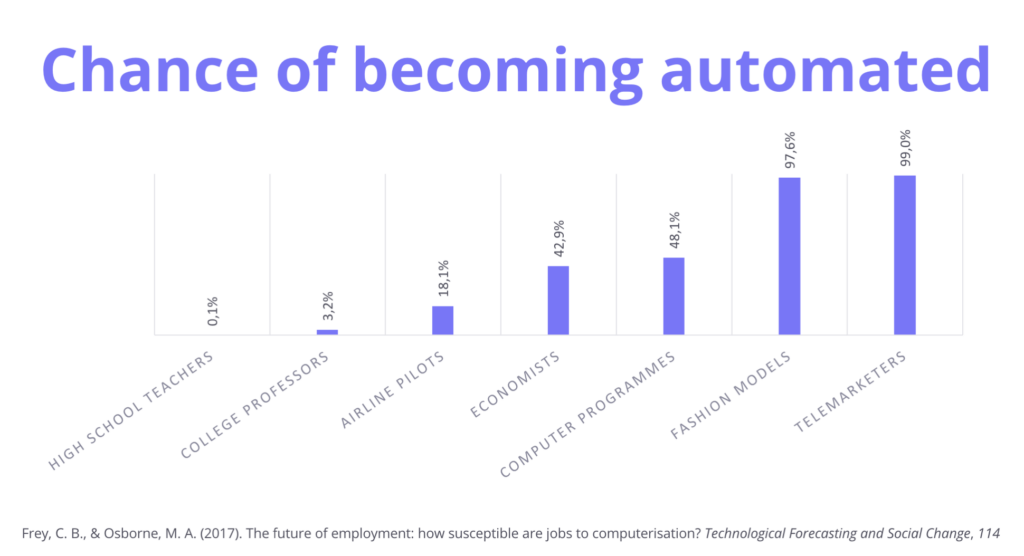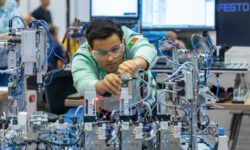By Dr. Topi Litmanen, Chief Educational Scientist at Claned Group
Recently the British newspapers Independent and Telegraph published articles about inspirational robots replacing teachers within 10 years. They cited Sir Anthony Sheldon, the Vice-Chancellor at the University of Buckingham, who was certain that teachers will become “little more than classroom assistants”. According to Sir Anthony, teachers will remain to set up equipment and maintain discipline, while the essential job of instilling knowledge into young minds will entirely be done by artificial intelligence.
Before considering the concept of learning this statement entails, let’s look at the likelihood of such a scenario. Two researchers from the University of Oxford; Carl Frey and Michael Osborne published a research in January 2017 on how suspectible specific jobs are to computerisation. Their methodology focused on identifying bottlenecks in computerisation development, which at the moment are 1) perception and manipulation (precisely coordinated movements or working in cramped work spaces), 2) Creativity (coming up with unusual, clever ideas or composing arts) and 3) social intelligence (being aware of others’ reactions and providing assistance). These are things, which human intelligence performs better than the artificial one.
The strength of teacher’s role
The results of the previously mentioned study were no surprise to anyone having worked at least a day in an actual school: There is no AI based replacement in sight. The probability for an elementary school teacher to be replaced by computerisation is 0.44% and in secondary school it’s 0.78%. As such, not something likely to happen any time soon. However, particular professions will rather certainly be replaced. If you are a telemarketer (likelihood of being replaced 99.0%) or fashion model (97.6%), your future does not look bright (see image below).

Image: Chance of becoming automated in different occupations
Thus far, the impact of intelligent systems in education have not been remarkable. The group of teachers who praise technologies as reducing their workload is hardly a majority one. However, even now we have a lot of digital applications, which could help teachers. Taking the load of routine tasks, delivery, administration or offering games for drilling and rehearsing would leave time for focusing on collaboration and discussions. Unfortunately, most schools are left with outdated systems, which they are unable or unwilling to replace.
For example, learning analytics do not just tell who has (or likely will) excel or fail in a test. For a teacher they can show which groups of students are struggling on which parts of a course and give recommendations on supporting materials for students. For a learner they can suggest how to overcome difficulties and give recommendations about relating topics, study buddies and ways to rehearse skills. In a few years we will come across useful personal learning assistants pushing the limits of our capacities as learners even further.
Extending the reach and impact of teachers
Instead of computers taking over the teaching profession, the more likely trajectory is that they will be serving as long awaited personal assistants. Learning at school is not merely a process of instilling knowledge. It is a journey during which one becomes an active participant in society and learns what it is to be a human being. This is hardly a task for a computer. As such, the focus should be on making robots serve, not outsource the teachers. The task of supporting the learner in their development is not something that can be outsourced. Building a constructive atmosphere for collaboration among students requires human interaction.
That does not, however, mean that teachers can rest with their bearings. Learning analytics and intelligent systems are coming to change the nature of classroom as they are able to offer personalized support for learners when they need it. The key to survival for a teacher is learning to use the available computerized support effectively.
———————
Dr Topi Litmanen (PhD) works as a Chief Educational Scientist in Claned Group. He has over 10 years of experience in designing and realizing digital learning solutions in professional settings. He has been in charge of both designing various learning products as well as implementing them. In educational research, he has focused on the effect of learning design elements on the learning process and learner experience.
Claned is a collaborative online learning platform that understands how we all learn. Claned personalizes learning to each individual improving their study motivation and learning results. This is possible by combining artificial intelligence, machine learning and Finnish pedagogy revealing what factors impact individual learning. More information at www.claned.com
